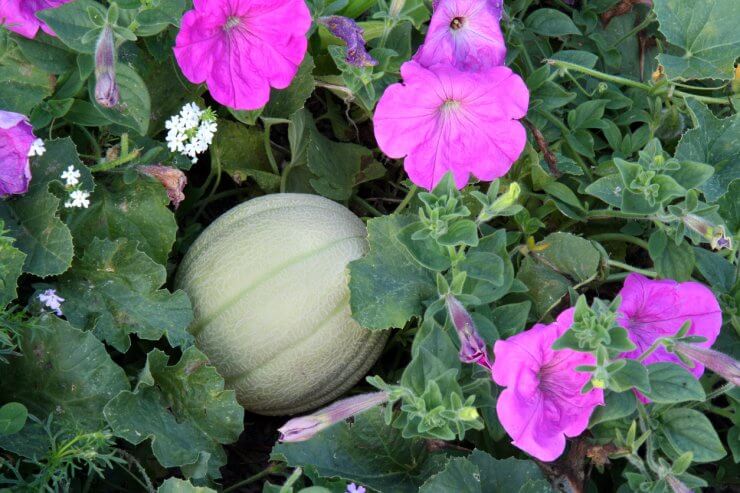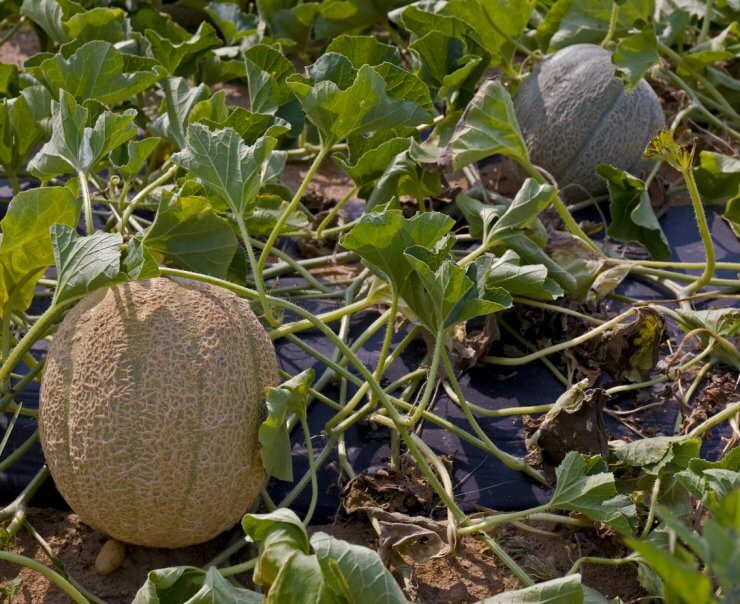
Honeydew melon in open ground
Melons need lots of sunshine and warm soil in order to thrive. Melons have a fairly long growing season, so be sure that the site you choose to plant has full sun throughout their growing time. Melons prefer warm summer temperatures between 65 to 95 degrees F.
They also need that soil to be well-drained with a pH of 5.8 to 7.0, depending on the variety of melon you plan to grow. You’ll definitely want to get your soil tested to determine which types of melons will do best in your soil. They’ll need consistent watering to help the plants grow and to help prevent fruit splitting.
Planting
You can prepare your planting area by laying down black plastic mulch over moist soil. This accomplishes several things at once: it helps the soil retain moisture; it help the soil retain heat; and it deters weeds.
Before you lay down that black plastic mulch, you’ll want to hill your soil up 8 to 10 inches, with a 1-foot diameter. Dig trenches about 3 inches deep all around the hill. Lay the black plastic mulch over the hill and let the ends go into the trenches. Weigh down the ends with soil.
Alternatively, you can use summer mulching materials, such as peat moss, compost, untreated grass clippings, or weathered straw. Put down a layer 3 inches thick.
Plant Spacing

Cantaloupe plant spacing of at least 4 feet apart
Ideally, you want 4 to 6 feet of clearance around each melon mound; some gardeners even recommend 7 feet between rows. Consult with your local garden center or read the seed packet directions for the varieties you choose to determine just how much space you need.
Keep in mind that you can tighten spacing up just a bit if you’re going to train your vines to a trellis. But remember that your plants will be sprawling underground as well; you don’t want to crowd their roots. Melons planted too close together will compete for vital resources, and they could all come out on the losing end.
Companion Planting
There are plenty of plants that will get along with melons. If you want to add a burst of color while including pest repellence, try planting nasturtiums, marigolds, tansy, or sunflowers. It can be a bit of a balancing act: nasturtiums are aphid magnets, so they should draw aphids away from your melons.
Sunflowers repel aphids, so you can add them to the mix if the nasturtiums need a little help. Hummingbirds love sunflowers, so they’ll help keep whiteflies away from your melons.
Marigolds, especially tagetes patula, or French marigold, is especially fragrant and will repel beetles above ground and soil nematodes below. And if you let the marigolds reseed, they’ll build up a nice pest barrier around your melons.
Tansy isn’t especially pretty, and it’s toxic to livestock, but it does a great job repelling ants, beetles, and other insects. It can be invasive, so you might want to consider planting it in a container to keep it under control.
If you want to do some intercrop planting with your melons, consider pole beans, bush beans, corn, radishes, or potatoes. Beans will increase the nitrogen in the soil, giving your melons some added nutrition—just keep that in mind when it comes time to fertilize.
Other crops that grow well with melons include broccoli, onions, leeks, chives, garlic, cabbage, Brussels sprouts, carrots, cauliflower, kale, okra, spinach, and lettuce.
How do you plant your melons? What criteria for site selection has worked for you? Do you include companion plants with your melon plants? Please share your ideas with us.


 Previous
Previous

